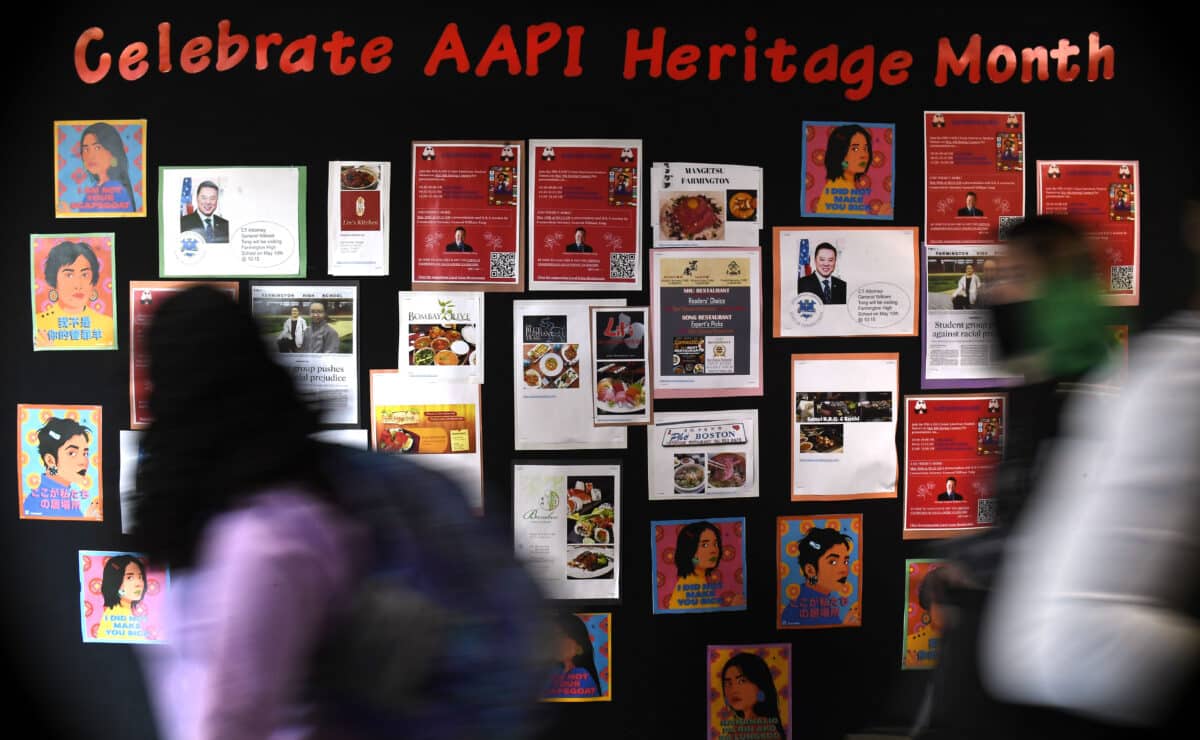What I think about when I hear the words ‘AANHPI Heritage Month’

FILE – Students walk past a display for Asian American Native Hawaiian Pacific Islander (AANHPI) Heritage Month at Farmington High School in Farmington, Conn., May 10, 2021. (AP Photo/Jessica Hill, File)
As May is our month, now known as the all-inclusive Asian American Native Hawaiian Pacific Islander (AANHPI) Heritage Month, keep in mind it’s intended as a celebration of culture and traditions – not necessarily our history.
Our history is much more ironic and bittersweet. History is also not necessarily “inherited,” though patterns remain hard to break.
So while we try to be positive as we pass around the lumpia, history was the reason May was chosen as our month.
We remember the good days and bad of Asians in America.
May 6, 1882, the Chinese Exclusion Act was approved, the first significant law restricting immigration to the US.
May 7, 1843 is when the first Japanese immigrant to America arrived, which would, of course, lead the way to a generation of Asian Americans who would later be incarcerated during WWII.
May 10 is also the day of the Golden Spike in 1869, that connected east and west within our borders and completed our country’s transcontinental railroad.
It was built on the backs of exploited Chinese immigrant labor from the Far East.
That’s the ironic and bittersweet parts that the anti-DEI folk wish we’d just forget.
Stephen Guillermo
For me personally, May 3rd has special meaning. It is the day my cousin Stephen Guillermo was murdered.
He was just 26, about to graduate from San Francisco State University, when after a night on the town, he returned to his family’s modest apartment on Mission Street in San Francisco.

Stephen Guillermo | CONTRIBUTED
He lived on the 5th floor but got off on the third. After a few drinks, apartment hall ways all look the same early in the morning.
Only this time it led to Stephen trying to enter the wrong apartment.
He was shot and killed with a single bullet. The apartment resident who shot him turned himself in and spent three nights in jail.
And then the SFPD and the District Attorney let him go.
They didn’t want to prosecute because of California’s version of “stand your ground,” based on something called the “Castle Doctrine” which gives the right of self-defense to any home-dweller with a gun who feels threatened by an intruder.
In 2014, I tried to make the case that a reasonable man, especially the suspect who was twice the size of my cousin, would not have felt threatened. Therefore, the suspect held should still be prosecuted for, at the very least, second-degree murder.
But there was no political will to challenge California’s law. No appetite to put a limit on self-defense as an alibi for a fatal mistake. Authorities had the killer, but they didn’t charge him.
They let him go.
My cousin was simply in the “wrong place, at the wrong time.”
Since then, people have started noticing how many “wrong place” shootings occur. In 2023, in less than a week, seven people were shot, one fatally, all from being at the wrong place.
One case in Kansas City involved Ralph Yarl, a 16-year-old African American kid, who went to pick up his siblings at a family friend’s home.
But he went to the wrong address.
That’s where Andrew Lester, then 84, heard the doorbell and grabbed his gun. He saw Yarl and thought he was attempting to break in. Yarl was shot once in the head and arm and told police Lester said, “Don’t come around here.”
Lester was charged with first-degree assault. Missouri has a “stand your ground” law. But unlike in California, no one was scared to stand up for Yarl in that state.
This year in February, Lester pleaded guilty to felony in the second degree. He was awaiting sentencing, which could have carried up to seven years in prison. But as he waited, Lester died this past March.
The Yarl family was sympathetic, but still say there’s been no justice.
At least Yarl survived the shooting.
My regret is that no officials in San Francisco were willing to challenge the California law for Stephen.
To them, it was just an African American apartment dweller shooting a young Filipino guy.
A case involving two poor people in America with more in common than not. It was a case that was meant to go cold and die.
And that is part of the broader history of violence against Asians in America. My cousin’s Filipino treatment was nothing new. The Chinese were lynched throughout California in the 19th century. Filipinos who were beaten, lynched and shot in the 1920s and ’30s in California from the Central Valley to the Central Coast in Watsonville.
My father was in that group of Filipinos in California in the 1920s. And now, here was his grand-nephew, an immigrant who almost 100 years later was just dreaming of the same things as my father.
Stephen’s story is a modern version of our Asian American experience, part of a pattern that we try to remember and break all at the same time. It’s not our heritage, it’s our history.
We don’t have to relive it.
With knowledge and understanding, we can do something about it. At the very least, we can move forward together.
And not repeat the tragedies of the past.
That’s what I think about every May, during our month, Asian American Native Hawaiian Pacific Islander (AANHPI) Heritage Month.
Emil Guillermo is an award-winning journalist, news analyst and stage monologuist. He writes for the Inquirer.net’s US Channel. He has written a weekly “Amok” column on Asian American issues since 1995. Find him on YouTube, patreon and substack.

